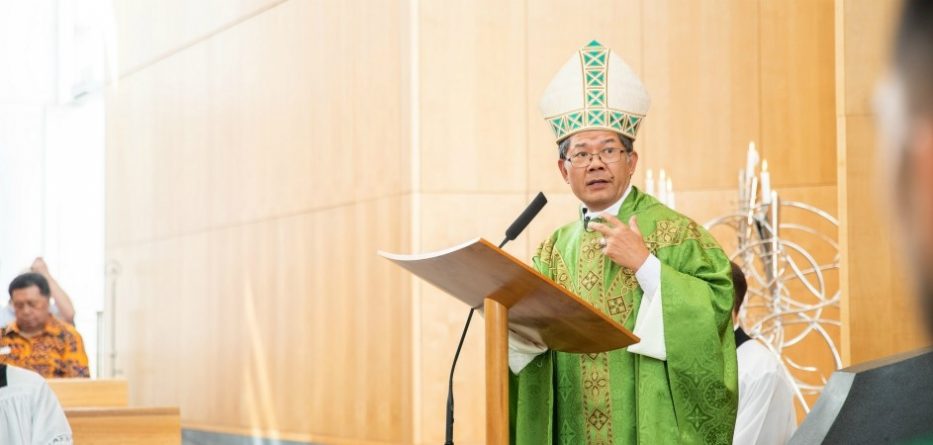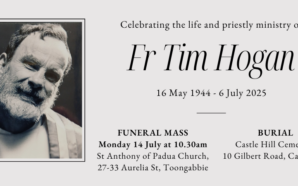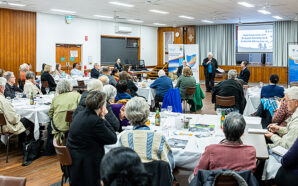Most Reverend Vincent Long Van Nguyen OFM Conv DD STL, Bishop of Parramatta
Homily for the 21st Sunday in Ordinary Time Year C 2019 at Vigil Mass at St Monica’s Parish, North Parramatta
Readings: Is 66:18-21; Heb 12:5-13; Luke 13:22-30
24 August 2019
God’s surprising way of making outsiders insiders
Dear friends,
We are living in a society that rewards people who are well-heeled and well-connected. The higher you are on the food chain, the more benefits you are entitled to. Conversely, if you happen to live somewhere on Struggle Street, the chances are you will not be able to have access to those benefits. You know this at an airport gate lounge when you hold an economy ticket or worse a standby ticket.
When it is time to board, you have to wait for the first class, business class ticket holders, and all others who are given priority boarding. They seem to matter more than you do on account of their wealth and station in life.
We might resent such preferential treatments and those who can afford them. However, there is another sense of entitlement that is more innate, subtle and pervasive in all of us. This is the spiritual kind of entitlement that makes us think we are worthier than others. It is a narrow mindset that limits God to the confines of our race, religion, ethnicity or culture.
This Sunday, the Word of God challenges this mentality. It addresses the question of outsiders as opposed to those who consider themselves chosen and privileged. It challenges the notion that God only acts within the interest of one’s group at the expense of others. More importantly, it presents us with the inclusive and boundary-breaking way of Jesus.
In the first reading, Isaiah in a moment of euphoria speaks about the vision of the new Jerusalem and the new Temple. The long exile has sharpened his understanding of the purpose of God and he breaks out into a joyful poetry of universal embrace. In this final chapter of the book, Isaiah speaks of a messianic age where Jerusalem will be a light to all the nations and a house for all the peoples.
At the height of Jewish monarchy, Solomon built a golden temple as a monument to himself and vassal states had to pay tributes to him. Ironically, Israel had also become an oppressive imperial system like Egypt, Assyria, Babylon and Rome. The new Jerusalem that Isaiah prophesies will not be a kind of “Make Israel Great Again”. Rather, it will symbolise a kind of universal embrace, which will rise above national, religious and cultural boundaries. It points to a wondrous future filled with justice, integrity, joy and hope for all.
His words also enlighten us as we seek to understand and to live the meaning of our experience in the Church and in the world. In so many ways, we feel like the Jewish survivors facing the monumental task of rebuilding from the ground up, after the devastation of the clerical sexual abuse crisis and the imprisonment of Cardinal Pell.
The future of the Church like the new Jerusalem Isaiah speaks of will not be revitalised by way of simply repeating what was done in the past. Rather, we must have the courage to do new things; we must be open to the Spirit leading us to new horizons even as we tend to revert to the old ways.
God acts beyond our narrow confines and stereotypes. This crucial insight gained during the exile is also reinforced and expanded by the boundary breaking way of Jesus. Last Sunday, we heard that discipleship was more important than family ties and biological relationships. Today, he teaches that discipleship trumps any claim of special treatment. “We once ate and drank in your company; you taught in our streets.”
These and similar claims carry no favour because God does not operate out of the merit based system of this world. Instead, in his sight, outsiders can become insiders so long as they are open to his way.
When we survey Jesus’ interactions with the people, those who showed great faith, openness and receptivity to him were not always the standard bearers, not always those who were of his race, religion, or even kindred. Instead we found to our surprise, they were the unlikely characters: the lepers, the beggars, the foreigners, the tax collectors, even prostitutes and sinners.
It was a reality check for the disciples to know that God would act outside their narrow confines of religion, race, ethnicity and culture. Today, we too need this kind of reality check. We need to rise above our tribal Catholicism.
This is what we might call “vintage Jesus”, one who calls out exclusionary attitudes and false claims of superiority. It is our humble service to the needy and the vulnerable that is the hallmark of Christian discipleship. It is, as the Letter to the Hebrews tells us, our embrace of suffering for the sake of the world transformed into God’s design.
Dear friends!
The world operates out of a merit based system that disadvantages the needy.
God calls us to openness to the surprising ways in which he conveys his presence and power.
Let us commit ourselves to walk as pilgrims open to be formed and enriched by the journey. May we in all the upheaval and chaos around us learn to act justly, love tenderly and walk humbly with the God of surprises.








